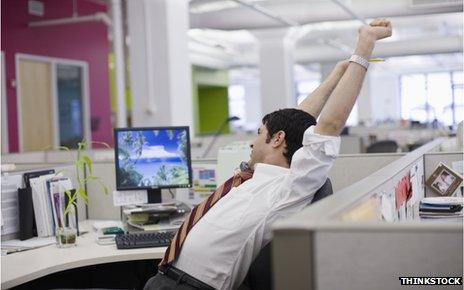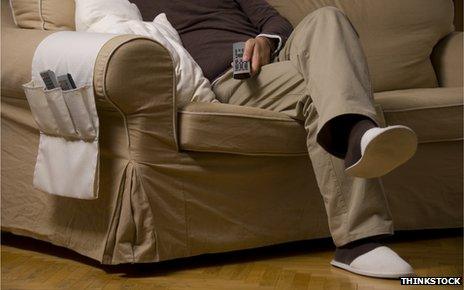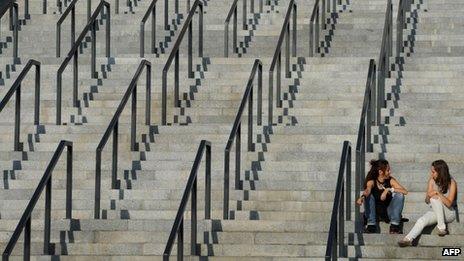A sitting person's guide to standing up
- Published

Office workers, bankers, IT experts and couch potatoes beware. Doctors are warning sitting down for too long can shorten lives. So how can the chair be countered?
Ever since the advent of the service industry, the nation has fallen in love with the swivel chair.
Study after study shows the UK is getting more sedentary in its working and home life.
Yet the dangers of sitting down for prolonged periods have also been well documented, with scientists saying there is a higher risk of obesity, Type 2 diabetes and heart disease. Now, in a <link> <caption>report for the online journal BMJ Open</caption> <url href="http://www.bbc.co.uk/news/health-18767278" platform="highweb"/> </link> , scientists say limiting the time we spend sitting to just three hours a day could add an extra two years to our life expectancy. Cutting daily TV viewing down to two hours could add on 1.4 years.
So how can those that live a sedentary lifestyle slip the shackle of the swivel chair and snatch some extra time standing up?
It's not just sitting down. Adopting any one posture for a long time is bad, says Jane White from the Institution of Occupational Safety and Health (IOSH).
"Some of the Met police recently collapsed at a passing out ceremony from standing up for too long. It's being static that's the health issue - it slows down the circulatory system, blood, oxygen and vital nutrients," she says.
White notes that 7.6m working days are lost a year as result of musculoskeletal disorders in the UK.

With desk-based office jobs on the rise, the IOSH "encourages <bold>more movements</bold>, <bold>more breaks</bold>, and <bold> taking time to consider health and wellbeing"</bold>, she says.
The IOSH has <bold>walking lunch groups </bold>and <bold>yoga classes</bold>.
But White says other companies are more inventive.
"In one, people are encouraged to <bold>stand when they take a phone call</bold> - apparently it was sold on the idea it burnt more calories. Another company has a <bold>no internal email day</bold>, so people have to leave their desks to deliver messages within the organisation.
"We've been to another company with a <bold>boardroom with no table and chairs,</bold> so meetings don't take so long. And we've had experience of offices having <bold>pedometers under desks</bold> - the British Heart Foundation has helped encourage that."
Priya Dasoju, a professional adviser and chartered physiotherapist, suggests simple things like <bold>setting reminders on an Outlook calendar </bold>to move every 20 minutes, or <bold>using a printer further away</bold>.
Other easy-to-implement actions are <bold>using stairs rather than lifts</bold>, <bold>offering to do the tea round</bold> and <bold>drinking more water</bold> and <bold>speaking to people in person</bold>. Even <bold> stretches at the desk</bold> help.
While <bold>getting off the train one stop earlier</bold>, <bold> parking a little further afield</bold>, or choosing to <bold>stand up rather than sit down on a commute</bold> is all time well spent, she says.
More strategic measures could include <bold>walking meetings, </bold>or <bold> limiting meetings to 10 minute periods</bold>, Dasoju says.
In an ideal world, the physiotherapist advocates tailor-made work stations, but they would cost money.
There should be a cultural shift, she says.
"It's not like bosses say, 'make sure you keep moving to look after your back', it is not really thought about. It is becoming more acceptable to go to the gym at lunch, but it needs to get to the point that it is frowned upon when people have lunch at their desks.
"There need to be <bold>exercise schemes</bold>, it needs to be <bold> part of inductions</bold>, rather than an aside. It has happened to a degree with flights which have got exercises on screens to prevent DVT," she says.
Dr Sarah Jarvis, a presenter on the BBC's One Show, says simple things like not storing items at the bottom of staircases - but <bold>taking items upstairs whenever they need to be moved</bold> - can make a big difference. As can <bold>parking far from the supermarket entrance</bold>.

"It's about setting targets - for example if an errand is less than half a mile away, walk.
"If people burn, say, an extra 100 calories over the course of a day by doing small things, that's a pound of weight in just over a month, which is not far away from a stone a year. Thinking of it like that can have an impact," she says.
White says she also has some personal tips on how to keep active in front of the screen in the - somewhat unhelpfully named - sitting room.
"Personally I enjoy Wii or Xbox with the kids - it can be dancing to Michael Jackson.
"I know my other half likes having a spinning bike in the shed - so he can escape the kids watching EastEnders. Ultimately, it's all about encouraging exercise and bringing it into mundane tasks at home," she says.
